|
|
|
Sort Order |
|
|
|
Items / Page
|
|
|
|
|
|
|
| Srl | Item |
| 1 |
ID:
144048


|
|
|
|
|
| Summary/Abstract |
George F. Kennan belongs among the most revered American foreign policy thinkers of the last one hundred years. He was also very protective of his future legacy, going to extraordinary measures to control it. These included authorising a single historian, John Lewis Gaddis, to write his biography, George F. Kennan: An American Life (2011). Is Gaddis’s account definitive? On the tenth anniversary of Kennan’s death, this article investigates this question as part of a broader critical reflection on methods and presuppositions governing traditional historiography. It answers in the negative by illuminating the various fictions of Gaddis’s ostensibly factual representation. These surface especially in contrast to The Kennan Diaries (2014), whose minimalist chronological structure makes the non-empirical content brought by Gaddis to his image of Kennan by virtue of narrativising it all the more visible. The larger implications of this finding are significant, particularly in the present geopolitical context of Russia’s renewed expansionism. Should the US foreign policy community (re)turn to Kennan for guidance in its attempts to understand and respond to Moscow’s current behaviour, what kind of diagnosis and prescriptions he has to offer depends on which Kennan one chooses to consult, giving historians behind his representations genuine political power.
|
|
|
|
|
|
|
|
|
|
|
|
|
|
|
|
| 2 |
ID:
144046
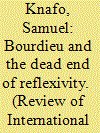

|
|
|
|
|
| Summary/Abstract |
This article examines recent attempts by International Relations (IR) scholars to flesh out a reflexive approach inspired by the work of Pierre Bourdieu. The French sociologist pioneered the idea of turning the tools of sociology onto oneself in order to apply the same grid of social analysis to the object and subject of scholarship. This represents the culmination of a long tradition of seeking to understand from where one speaks and grasp our subjective biases through reflexive means. But as I argue Bourdieu – like most reflexive scholars – largely overestimated his ability to grasp his own subject position. For he assumed he could be objective about the very thing he had the least reasons to be objective about: himself. Instead of bending over backwards in this way and directly take the subject into account, I then propose to rearticulate the problematic of reflexivity by going back to a more classic concern with the question of alienation. Through a detailed critique of Bourdieu’s reflexive approach and the ways in which it was received in IR, I set out a series of principles to reconfigure the agenda of reflexivity and offer a platform for a proper methodological alternative to positivism.
|
|
|
|
|
|
|
|
|
|
|
|
|
|
|
|
| 3 |
ID:
144050
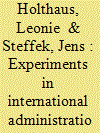

|
|
|
|
|
| Summary/Abstract |
In this article, we reintroduce the political thought of James Arthur Salter (1881–1975), a British diplomat, politician, and university professor, who made a seminal contribution to the emergence of International Relations theory in the interwar years. His academic writings were informed by his professional engagement with the Allied Maritime Transport Council (AMTC) during the First World War and the technical branches of the League of Nations. Salter promoted a distinctly transgovernmental form of expert cooperation in international advisory bodies connected to national ministries. His vision of a depoliticised transnational expertocracy inspired various IR functionalists, not least David Mitrany. Salter suggested such forms of governance also for British national politics, drawing what we call here an ‘international analogy’. His work illustrates very well how the emergence of IR theory was connected to broader trends in political theory, in particular in efforts at adapting democracy to the increasing complexities of industrial modernity.
|
|
|
|
|
|
|
|
|
|
|
|
|
|
|
|
| 4 |
ID:
144052
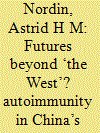

|
|
|
|
|
| Summary/Abstract |
It has become fashionable among International Relations scholars to draw on the concept of ‘autoimmunity’, which some call ‘the ultimate horizon in which contemporary politics inscribes itself’. To these scholars, most of whom draw on the thought of Jacques Derrida, such logics open systems up to a future to come. At the same time, they tend to identify such logics with Europe, America, Western modernity, and/or democracy. Implied, and sometimes explicit, in their accounts is the denial of autoimmune logics at work outside such an imagined configuration.
This article challenges that denial through arguing that the system of ‘harmony’, deployed in contemporary China, also works on an autoimmune logic. If autoimmunity opens up a system to the future, this is not only so for European democracy or its derivatives. Moreover, the expulsion of ‘non-Western’ others from accounts of autoimmunity undermines their rethinking of difference by falling back on an immunitary logic, denying China an open future. This exclusion is their condition of possibility. At the same time, this exclusion is what keeps open their promise of its future to come. Paradoxically, the exclusion of the ‘non-West’ is what keeps the idea of an autoimmune ‘Western’ or European democracy alive.
|
|
|
|
|
|
|
|
|
|
|
|
|
|
|
|
| 5 |
ID:
144045
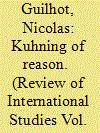

|
|
|
|
|
| Summary/Abstract |
Beyond the initial infatuation with his work, Kuhn’s Structure of Scientific Revolutions has had a lasting impact on the field of International Relations. The article analyses the reception of Kuhn in IR and suggests that it contributed to overcoming the ‘second debate’ by making science and realism fully compatible. More importantly, Kuhn offered a vision of science in which scientific communities operated on the basis of realist principles. This not only consolidated the academic hold of neorealism, but transformed realism into a theory of knowledge, which its critics have failed to acknowledge. This lasting transformation is analysed by looking at Kuhn’s influence on the classic studies of strategic decision-making by Graham Allison and Robert Jervis.
|
|
|
|
|
|
|
|
|
|
|
|
|
|
|
|
| 6 |
ID:
144051


|
|
|
|
|
| Summary/Abstract |
My aim in this article is to ask how both the findings and the limitations of social science should inform the debate on global economic justice among liberal political philosophers. More specifically, I make three claims. First, I show that social science research casts doubt on key premises of important liberal global justice theories. However, second, I also suggest that empirical questions pivotal to these theories bring to the fore important limitations inherent to social science work on global issues. These limitations lead me to argue, third, that new normative concerns should feature in liberal discussions about global reform.
|
|
|
|
|
|
|
|
|
|
|
|
|
|
|
|
| 7 |
ID:
144049


|
|
|
|
|
| Summary/Abstract |
This article starts from the premise that empathy is an inherent part of social and political life but that this is not sufficiently theorised in International Relations (IR). Building on the burgeoning debates on emotions in world politics, it argues that the study of empathy should be developed more rigorously by establishing an interdisciplinary and critical framework for understanding the experiences and processes of empathy in IR. The central contribution of the article is twofold: firstly, it highlights limitations of the dominant perspective on empathy in IR, and secondly, it argues that a range of meanings may be attributed to empathy when examined within the sociopolitical conditions of particular contexts. Drawing on research on the conflict in Israel and Palestine, the article identifies and articulates two such alternative interpretations: empathy as non-violent resistance and as a strategy of normalisation.
|
|
|
|
|
|
|
|
|
|
|
|
|
|
|
|
| 8 |
ID:
144053
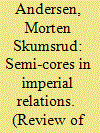

|
|
|
|
|
| Summary/Abstract |
Recently, the field of International Relations has seen increased interest in international hierarchy, and also an upswing in the analytical study of imperial logics of rule. Nonetheless, existing structural models of empire focus on core-periphery dynamics, and so cannot explain polities that display elements of both core and periphery. Therefore, I offer the new concept of ‘semi-cores’. Semi-cores are a specific form of historical political associations whereby certain imperial provinces are different from the others in terms of the close relationships it maintains with the imperial metropolis. Semi-cores are different by virtue of being relatively similar. The conceptualisation of semi-cores is followed by a section illustrating its logic, examining the relatively unfamiliar cases of Scotland and Norway and their position within the Danish and British empires, respectively. Although being separate imperial provinces, these were tightly connected to an imperial core. This concept helps us better understand imperial logics, and in the process shows how cultural factors can be formalised into accounts of structural logics of rule, impacting our understanding of both historical and contemporary hierarchical international affairs.
|
|
|
|
|
|
|
|
|
|
|
|
|
|
|
|
| 9 |
ID:
144047
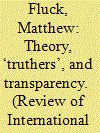

|
|
|
|
|
| Summary/Abstract |
The current era is often described in epistemic terms, as an ‘information age’ or ‘knowledge society’. Such claims reflect ideals that are deeply ingrained in modern societies. There is a widespread assumption that successful social and political interaction involves access to information and that political power is gained when knowledge replaces obscurity. Such assumptions reflect contemporary ‘epistemic folkways’, which are manifested in two widespread epistemic phenomena – faith in ‘transparency’ and conspiracy theorising
International Relations (IR) theorists should be well-equipped to understand such developments. However, reflection concerning epistemic matters in IR is in under attack, increasingly presented as a distraction from the formulation of empirically grounded accounts of international politics. This article argues that reflexive theory can in fact play an important role in helping IR scholars to understand contemporary epistemic folkways. Drawing on the Critical Theory of Theodor Adorno, it is argued that the transparency ideal and conspiracy theorising reflect the efforts of individuals to increase their influence in a world in which they are both objects of technical knowledge and, in principle, epistemically empowered subjects. Reflection on the subject-object relationship suggests that the pursuit of increasingly unmediated access to information is in fact a key source of reification and disempowerment.
|
|
|
|
|
|
|
|
|
|
|
|
|
|
|
|
|
|
|
|
|